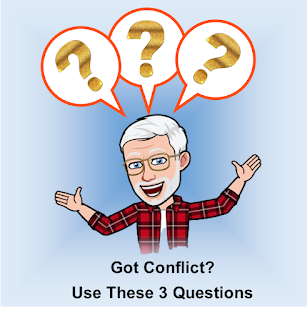Understanding Three Types of Conflict—and How to Keep Them from Becoming an Office Reality Show
Conflict happens. Whether it’s a clash of ideas, personalities, or processes, how we handle it can mean the difference between a productive breakthrough and a cringe-worthy episode of "Workplace Dramas: The Never Ending Story."
Conflict happens. Whether it’s a clash of ideas,
personalities, or processes, how we handle it can mean the difference between a
productive breakthrough and a cringe-worthy episode of "Workplace Dramas:
The Never Ending Story."
The first step? Identifying the type of conflict you’re
dealing with. Let’s break it down.
1. Task Conflict –
Innovation in Disguise
Task conflict pops up when people disagree about what
needs to be done. It’s the classic brainstorming session scenario—one person
envisions a sleek PowerPoint masterpiece, another sees an elaborate 50-page
report, and someone in the corner just wants a decision.
While it might feel like herding cats, task conflict isn’t
inherently bad. In fact, it can lead to innovative solutions—if managed
well.
How to Handle Task Conflict:
- Encourage
open and respectful discussions.
- Focus
on ideas, not personalities (no eye-rolling, please).
- Don’t
rush to dismiss ideas too quickly.
- Find
common ground and aim for consensus.
Think of it as creative tension—a bit like tuning a guitar.
Too loose, and nothing happens. Too tight, and…snap!
2. Relationship
Conflict – Personalities Collide
This is where things get…personal. Relationship conflict
arises from clashing personalities, differing communication styles, or that
lingering irritation from an unfortunately worded email.
It’s tough because emotions get involved, and suddenly logic
takes a back seat to feelings.
How to Handle Relationship Conflict:
- Show
(and ask for) empathy and active listening.
- Address
issues directly, but with sensitivity.
- Build
mutual respect—ground rules can help if things are messy.
- Agree
on shared goals for the relationship moving forward.
Remember: Remind everyone that they do not have to like
everyone they work with, but mutual respect is non-negotiable.
3. Process Conflict
– The “How” Gets Messy
Process conflict isn’t about what needs to be done but
how to do it. Should we use Trello or sticky notes? Weekly check-ins or
daily stand-ups? Should the coffee maker be cleaned every Friday or only
when it looks haunted?
These disagreements can slow progress and make teamwork feel a
bit like walking through quicksand.
How to Handle Process Conflict:
- Define
roles, responsibilities, and workflows clearly.
- Gather
input from everyone involved—better buy-in means smoother sailing.
- Establish
an ultimate decision maker if the group can’t decide.
- Promise
to revisit and adjust procedures regularly.
The goal is clarity and collaboration, not never ending
debate.
Turning Conflict
into Growth
Conflict isn’t always a villain—it’s often the catalyst for
growth, better communication, and stronger relationships. But it needs to be
managed to these more desirable end points!
So, next time conflict rears its head, don’t panic. Pause,
identify which type you’re dealing with, and apply the right strategies.
Have you faced any of these conflicts recently? How did you
handle them? Share your stories below—let’s turn our collective chaos into
wisdom!
(And hey, if you’ve figured out the perfect coffee machine
cleaning schedule, we’d love to know that too.)
__________________________________
Free Consultation - Just Ask!
I offer free consultations on conflict, facilitation, difficult meetings, public involvement, online meetings, and collaboration in general. Schedule an opportunity to talk with me about your issue. I promise to not trap you into a marketing message. We will stick to problem-solving on your issue. Click for Appointment
Contact Us:
Michael Fraidenburg
Olympia, WA, USA.
Email Mike




